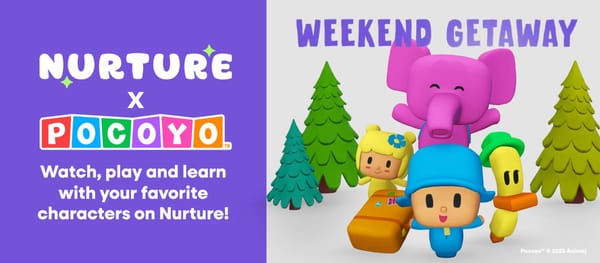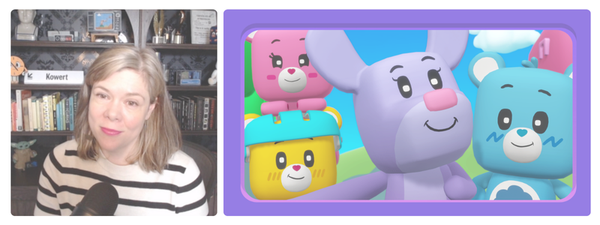Social skills, a category of foundational life skills, refers to the various abilities we use to communicate and interact with others effectively. There is a wide range of skills that are considered “social skills”, such as:
- Active listening
- Respect
- Using and understanding body language
- Empathy
- Emotional intelligence.
While we might have felt more comfortable modeling and teaching these skills to our kids a decade or two ago, social skills now encompass digital communication and online interactions, leaving many parents feeling less confident in being able to guide their children through this expanded social landscape.
“Social” just means so much more these days.
Nurture is a kids’ app that develops Life Readiness skills such as creativity, curiosity, and critical thinking. All the more important in the age of AI, they're developed through fun, interactive, story-driven adventures. Nurture Academy — that’s where you are right now! — is for parents learning what it takes to raise smart, happy, and resilient kids in our increasingly digital world. We’re glad you’re here!
Read on, then discover how Nurture works or get the app.
When young kids reach the ages of 4-7, they start to become more social, with their social capacities developing from both in-person and on-screen (digital) engagements. Research gives us some direction on how we can approach social learning in the digital era. Let’s talk about how to translate those findings into everyday habits and moments that can make all the difference.
With understanding and intention, we can take strong initiative in our kids’ social skills development in the age of digital seamlessness.
What Are Social Skills, Emotional Intelligence, and Empathy — and How Are They Connected?
When we talk about social skills, emotional intelligence, and empathy in kids, we’re really talking about how they learn to connect with others. And in a roundabout way, with themselves. These foundational life skills often develop together, and each one plays a critical role in helping young children thrive at home, at school, and in friendships (both off and online).
At this age, kids are learning to label emotions. So their emotional intelligence, self-regulation, empathy, and ability to communicate their feelings are actively developing. Thinking of Erik Erikson’s Stages of Psychosocial Development, kids of this age are activating their initiative. Children explore their abilities through play and social interaction. So they’re learning to take social initiative and be able to make friends. And a big part of that is empathy.
Social Skills
Social skills are the outward behaviors that help kids communicate and build relationships. These include things like:
- Taking turns
- Listening to others
- Sharing
- Recognizing personal space
- Cooperating in group play
These are all the abilities we have that enable communication, interaction with other people, and relationship building. These can be verbal (like using kind words) or nonverbal (like nodding, smiling, or showing you’re listening).
In online and digital play, these skills can still be verbal or non-verbal, but they may look quite different. For example, verbal skills might include voice chat etiquette, while nonverbal cues could involve choosing the appropriate emojis or reaction features to acknowledge others.
Emotional Intelligence
Emotional intelligence (EI) is the ability to navigate the world around us. That means how you recognize, understand, and manage your own emotions, and respond appropriately to the emotions of others. This includes:
- Self-awareness: understanding how you feel and why
- Self-regulation: managing big emotions like frustration
- Empathy: connecting with how others feel
- Social skills: expressing your needs and reading cues from others
Emotional intelligence is essential not only for communication but also for stress management and emotional regulation in everyday life.
“Digital” emotional intelligence also involves recognizing and responding appropriately to others’ emotions, but through digital cues, such as emoji use and response timing, while also managing your own emotional reactions before posting or responding (for instance, if you are feeling angry or frustrated).
Empathy
Empathy is the ability to feel with someone else. Not just noticing that they’re sad, but imagining how that sadness feels. It’s not just saying you’re sorry, but about feeling with others and being curious about their emotions.
It’s a core part of emotional intelligence and a foundation for building friendships. And it can still happen on screens, both in practice and development.
For example, the Proteus Effect is a term used to describe how people’s behavior and attitudes change to match the characteristics of the characters they play in games. When players embody characters with different traits, backgrounds, or challenges, they can develop greater empathy and understanding for those groups in real life.
Taking a recent example, researchers found that when people play video games featuring characters with mental illness, they showed increased empathy towards those with mental health challenges, demonstrating that digital interactions (even with fictional characters) can genuinely foster empathic understanding.
Why These Skills Matter in Early Childhood (and for Life)
Young childhood is a crucial time for developing emotional and social skills. This is when kids begin interacting with peers more regularly, in preschool, at birthday parties, and on the playground. They’re learning to navigate social spaces with less adult scaffolding, which makes this an ideal time to lay the foundation for healthy relationships.
Communication and relationships are the foundation of everything we do. Whether we’re navigating friendships, family dynamics, or classroom expectations, being able to understand how we feel — and how others feel — is critical. That’s what social skills and emotional intelligence give us: the ability to connect, relate, and respond with intention.
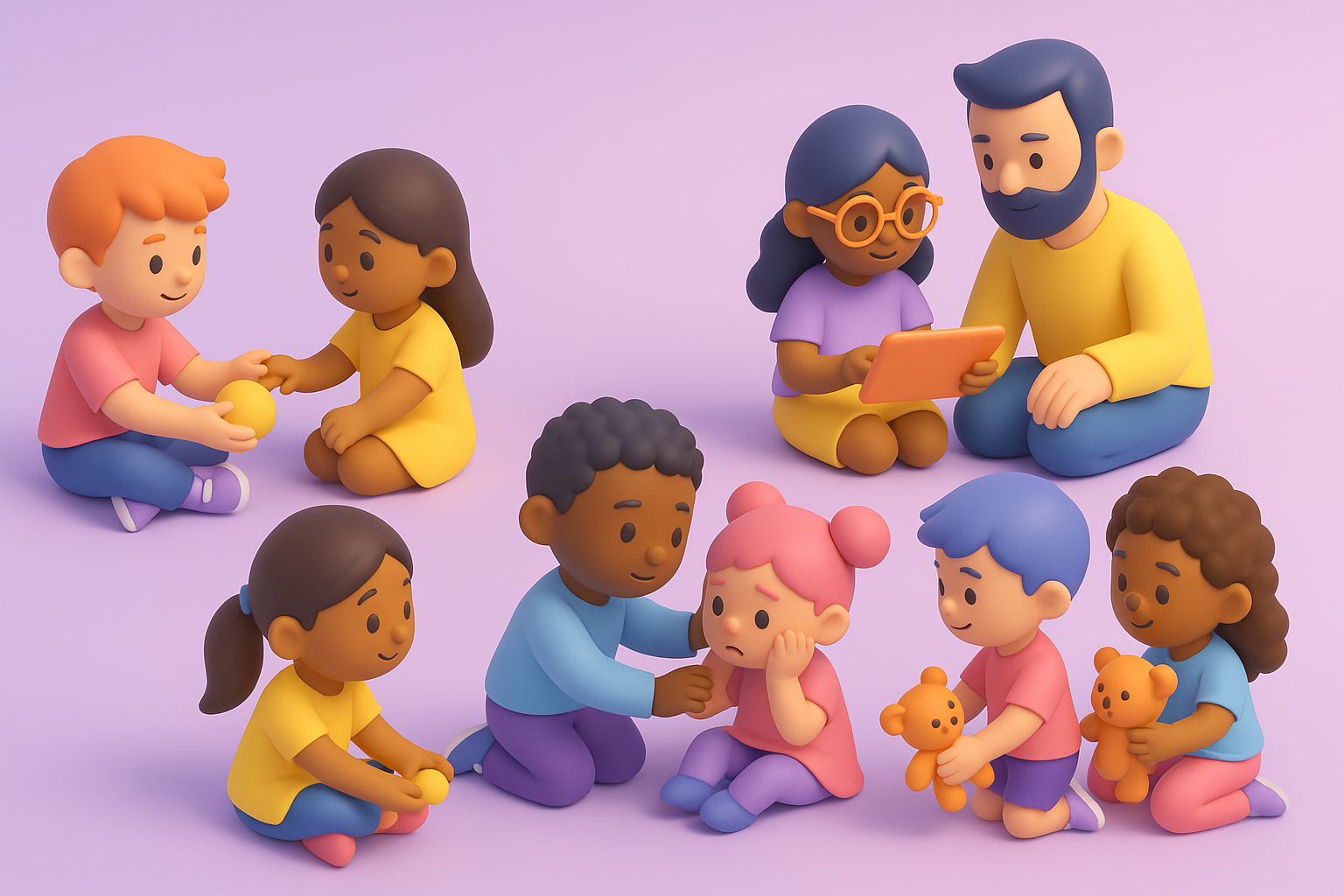
For young kids, this means they’re better able to build friendships, manage frustration, and participate meaningfully in group settings. When children can “read the room” and respond with empathy, they’re more likely to share, take turns, and notice when someone’s upset.
These skills not only create a smoother classroom experience, but they also improve mental health outcomes. The Collaborative for Academic, Social, and Emotional Learning found that kids who participated in social-emotional learning programs showed improved behavior, stronger emotional resilience, and an 11-point gain in academic achievement.
And while emotional development can happen in the classroom, some of the most powerful learning happens at home. Research by John Gottman has shown that when caregivers consistently coach kids through their emotions — by labeling feelings, validating them, and offering guidance — children develop stronger self-regulation, fewer behavior issues, and deeper peer relationships. It’s not about giving a lecture, but rather being present, narrating emotions in the moment, and helping kids name what they’re feeling.
We also know that these skills are especially important, and sometimes more challenging, for kids with learning or thinking differences. According to the National Association for the Education of Young Children, emotional intelligence in early childhood is linked to better attention, coping, empathy, and school engagement.
But here’s the challenge: these skills often fall into what I call the “life preparedness gap.” Unlike math or reading, we rarely teach emotional intelligence in a structured way — yet it’s just as essential. The earlier we start modeling and supporting these abilities, the more confident, connected, and resilient our kids will be.
Whether we’re four or forty, understanding how to navigate emotions and relationships is what helps us thrive.
What Empathy Looks Like in 4–7-Year-Olds (and What to Expect)
Empathy in young kids isn’t always verbal or obvious, because they’re still figuring it all out. Between ages 4 and 7, empathy shows up in simple, often curious ways, perhaps like:
- A child asking, “Why is he crying?”
- Offering a toy to a friend who looks upset
- Comforting a stuffed animal during pretend play
At this age, kids are just beginning to take the perspective of others. We might see them imitate adult responses before they feel genuine empathy, and that’s a healthy part of the learning process.
Empathy tends to grow from sympathy. Think of these as:
- Sympathy = Feeling for someone (“I feel bad he lost his toy.”)
- Empathy = Feeling with someone (“I understand why he’s sad. I felt that way too.”)
Kids may start by noticing another’s sadness, and with guidance, begin to imagine how that person feels based on their own experiences.
Core Social Skills Every Young Child Can Learn
Here are age-appropriate skills that help kids connect and collaborate with others, especially as they enter preschool and early elementary settings.
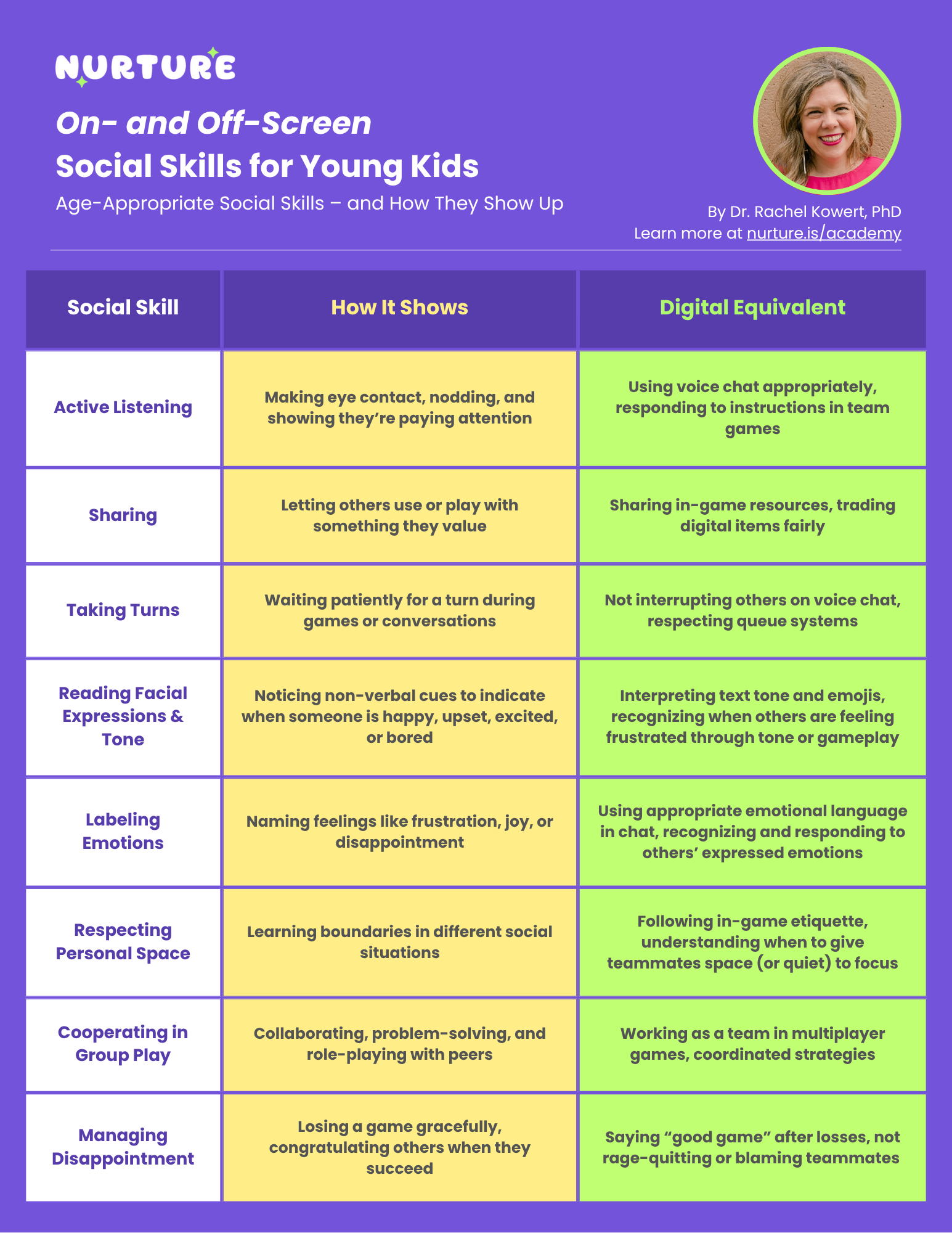
Some skills, like conflict resolution, may still be further off in development. Kids may need more support navigating disagreements (“He took my toy — I hate him!” is still common). That’s where co-regulation and modeling come in.
The Role of Rules
Rules are important to setting social boundaries and limits, but they don’t lead the way when it comes to helping kids develop their social skills. As kids start to think deeper about the humans around them, they pick up on emotions at every angle.
A rule is not emotion. A peer’s discomfort is emotion. It’s one thing to say, “We don’t throw the controller when we’re frustrated.” It’s another to say, “If you feel that you’re starting to become frustrated, take a deep breath, walk away, take a break.” That would lean more on emotional intelligence and emotional regulation rather than setting and enforcing a rule.
Everyone (as an adult or child) has experienced the kid who says sorry — and we know they don’t really mean it. That’s the difference between understanding, having emotional intelligence and empathy, and just following a rule.
How Parents and Caregivers Can Nurture These Skills
Kids aren’t born knowing how to manage emotions or build relationships. They learn by watching us. Here are some ways you how you can support their growth day-to-day.
Label Emotions — Yours and Theirs
Kids often see emotions as black and white (happy or mad). Help them recognize nuance: “I’m not mad, I’m scared. I raised my voice because I was worried when you ran into the street.”
When playing online games together, parents can also model emotional labeling: “I’m feeling frustrated because we keep losing, but I am not angry at you. Let’s take a break and try a different strategy.”
Narrate Feelings During Play or Stories
While reading, watching a show, or playing games together, simply ask something like, “He looks sad because his friend left. What would you say if you were there?”
When watching a show or playing a game, you can take a moment to discuss the emotions that are being portrayed on-screen. For example, “Look at how that person (or player) reacted when they were being helped by someone else. They seem grateful. How can you show appreciation to others?” Or, “They seem frustrated after losing that round. What is a kind thing we could say in chat?”
Co-Play and Co-View
Be present during screen time when possible. Use shows and games with emotional storylines as launch points for deeper conversations. For instance, Nurture adventures includes built-in prompts to help kids reflect on characters’ emotions in the moment.
Playing cooperative online games together where you can model good sportsmanship, teamwork and communication is also a great opportunity nurturing these skills. For example, when you say things like “Let’s tell our teammate ‘nice try’ even though they missed that shot”, you are showing your child how to demonstrate empathy to others through their behaviors.
Use Open-Ended Questions
Invite reflection and perspective-taking:
- “How do you think she felt when that happened?”
- “What do you think might help him feel better?”
- “How would you feel if that was you? What would make you feel better?”
Stay Calm During Meltdowns
Your nervous system sets the tone. When kids are overwhelmed, your calm presence can help co-regulate and guide them through the moment.
Activities That Build Empathy and Emotional Skills
You don’t need fancy printables or formal lessons to build emotional intelligence, just everyday moments and a little intentionality. There are so many easy, engaging ways to help kids practice empathy and social skills in ways that feel fun and natural.
Pretend Play
Pretend play and role-playing are fantastic starting points. Whether it’s acting out a story with stuffed animals or playing “feelings charades,” kids begin to explore how others might feel in different situations. You can even pause mid-play and ask, “How would you feel if that happened to you?” These kinds of questions open the door to perspective-taking, which is a cornerstone of empathy.
Storytelling
Books and stories also offer great practice. During storytime, I often encourage parents to ask questions like, “What’s that character feeling? Have you ever felt that way?” You can do the same thing while watching shows or playing narrative games — especially when the story includes emotional moments.
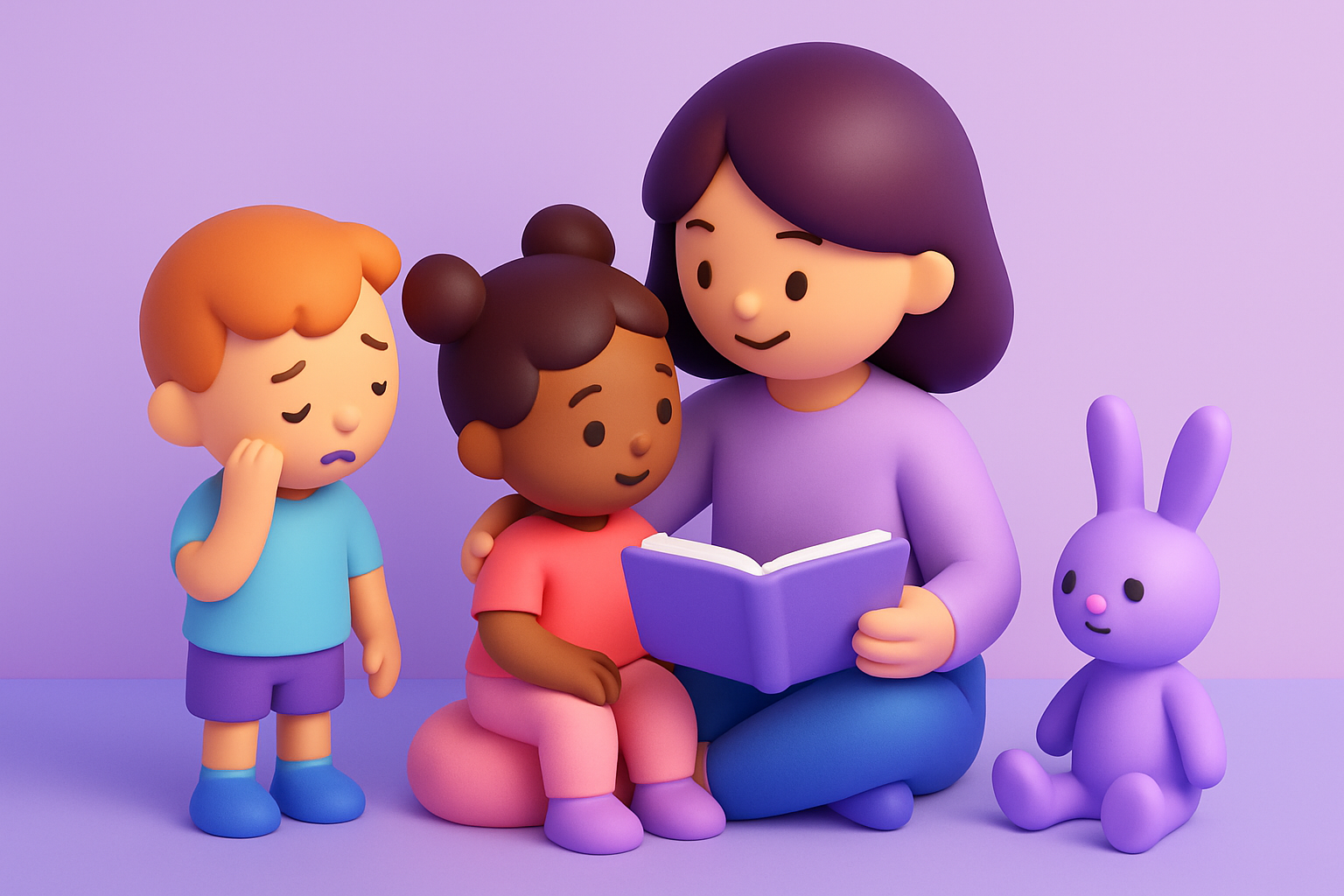
It creates just enough distance for kids to feel safe reflecting on those feelings, and over time, that reflection starts to translate to real-life relationships.
Board Games
Board games are another hidden gem. Any game that involves taking turns, handling a loss, or working with others can help build critical social skills. Personally, I love Dungeon Mayhem. It’s a fast-paced card game that even young kids can learn. Because the rounds are quick, everyone gets a chance to win and lose — which means everyone also gets a chance to practice emotional regulation and cheering each other on.
Helping Out
Helping and caregiving tasks are also deeply empathetic in nature. Things like feeding a pet, watering plants, or drawing a picture for a sick friend give kids a chance to think about others’ needs and how to respond. You might ask, “How do you feel when you’re not feeling well?” and then, “What do you think might cheer them up?”
These simple acts can reinforce the idea that caring feels good, for both the giver and the receiver.
Digital Play
Digital experiences can absolutely support empathy when used intentionally. Whether it is talking about how the main character of a game is feeling or navigating a difficult situation (remember the Proteus Effect!) or discussing other elements or characters in a game, these moments can allow for the opportunity to discuss new experiences, scenarios, and (potentially) emotions with your child.

I mean, how often do we get to talk about the unique frustration and feeling of loss from not getting the treasure we really wanted in the treasure chest we worked really hard to get? Nurture adventures are designed to spark conversations in the moment. If a character feels left out or disappointed, pause and talk about it: “Why do you think they felt that way?” or “What would you do if that happened to you?”
Games provide natural moments of conflict or collaboration, which is a great opportunity to open discussions with your child. When caregivers co-view and co-play with intention, screen time becomes another opportunity to nurture emotional growth.
Supporting Different Temperaments, Needs, and Social Styles
Empathy and social ease don’t look the same for every child. Some kids are naturally outgoing and pick up on social cues quickly. Others need more time, more support, or just a different approach to get there.
Not everyone wants to be outgoing, but we all need to develop a foundation of social skills to be able to navigate the world. That’s important.
Children with ADHD, autism, or anxiety, for example, may have a harder time labeling their own emotions or understanding someone else’s. Some kids need more scaffolding. They might get stuck in sympathy and not get toward empathy. They might think, ‘I don’t know why he’s sad — he just is.’ That’s where we can step in and help build the bridge.
None of us are born with emotional intelligence above an instinctual level, we develop it over time, with modeling, feedback, and practice. Some kids just need more of that practice, or different ways to engage with it.
Social skills also aren’t always culturally universal. They can contain a lot of nuance between households. In some countries, you stand closer. The personal distance is different than in other countries. Some nonverbal communications are going to mean different things in different cultures.
So while foundational abilities like understanding tone or facial expressions are important, how they’re expressed — and what’s considered appropriate — can vary from child to child, family to family, and culture to culture.
Emotional intelligence includes knowing yourself and respecting others and all their differences and diversity. Whether your child is sensitive, spirited, quiet, or neurodivergent, what matters most is helping them grow into someone who can recognize feelings and treat people with care. That’s the heart of emotional intelligence.
Social Skills, Empathy, & Emotional Intelligence Grow with Practice
These aren’t one-and-done lessons. They grow with time, modeling, and lots of repetition.
Kids are always watching and learning. Even when they don’t seem to be listening, your calm voice, labeled emotions, and moments of connection are shaping their emotional world.
We continue learning social and emotional skills throughout our lives, but four to seven is foundational. It sets the tone for how kids interact with others — now and in the future.





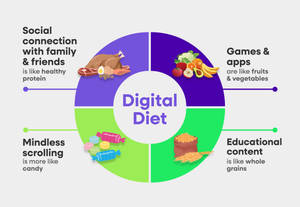
 Copy Link
Copy Link
 Share
to X
Share
to X
 Share
to Facebook
Share
to Facebook
 Share
to LinkedIn
Share
to LinkedIn
 Share
on Email
Share
on Email
